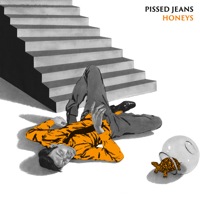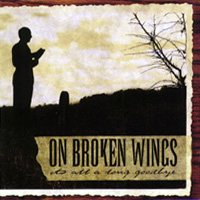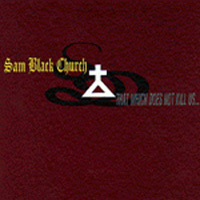 Sam Black Church
Sam Black Church
That Which Doesn’t Kill Us
An interview with Richard G. Lewis (bass), Ben Crandall (guitar), J.R. Roach (drums), Jet (vocals)
by Scott Hefflon
This is your first record in over two years. Gosh, what was the hold up?
Richard (G. Lewis, bass): We got held up by Taang! Records. We were trying to get rid of them, and it just took a lot longer than we’d hoped. When we finished Superchrist, we were supposed to be done with Taang!, then this record would’ve come out a year and a half ago.
Ben (Crandall, guitar): In a nutshell, our relationship with Taang! got progressively worse over the years.
Richard: But while we bitch about them, things started well when the first EP came out.
Ben: We really had no problems at all though the first two records, then when they moved to the West coast, maybe even a little before, they started really neglecting us. They had no personnel…
 Richard: And we weren’t around town lap-dogging them.
Richard: And we weren’t around town lap-dogging them.
J.R. (Roach, drums): When they were in Cambridge, we were constantly in their office. It was easy to get in touch with Curtis, and Curtis’ word is the final word.
Richard: It was a total lack of communication. If you’re a band on a label and you can’t get in touch with your label, it becomes increasingly frustrating.
Ben: When Superchrist came out, Taang! had one or two people in California and one in Massachusetts. That one was running the record store during the day and doing our artwork at night, not to mention packing to move to California. The record was recorded for a third of the budget we were due. It’d been a year and a half since Let in Life came out, and we really needed another record.
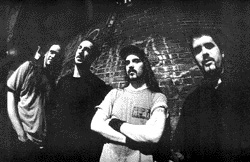 This record, independently funded and released, sounds better than anything you’ve ever recorded.
This record, independently funded and released, sounds better than anything you’ve ever recorded.
Richard: That Which Does Not Kill Us… cost a lot more money than Superchrist.
Jet (vocals): But still less than Let in Life.
Who produced the new record?
Richard: An old friend of ours, Rich Costley, who also did Superchrist. He’s a Berklee dropout who does really good work, and is now living on the West Coast.
J.R.: Let in Life is pretty much the only CD Rich didn’t do for us.
Ben: We’d recorded Superchrist for a lot less than we were supposed to get, and then it didn’t get pushed at all. We went on tour and there would be posters for other Taang! bands, but not us.
J.R.: Everywhere we went, kids were telling us they couldn’t find our record.
And that’s when the offer came in?
Ben: We knew we were done with Taang! We called them and told them Superchrist was going to be our last album for them. Then we got an offer from Geffen.
J.R.: Suddenly Taang! became completely incommunicado. They would answer us once a month, but they didn’t want to discuss anything. It was later proven in court that we fulfilled our contract, and we did terminate the contract properly. All the crap was caused by Curtis stalling and stalling and ignoring us.
Richard: Finally, Geffen just couldn’t wait any longer. They gave us a year, which is pretty impressive for a big label. We thought we could deal with this in a businesslike manner, but it didn’t work. We came to the assumption that everything Curtis was doing was to end our career. We don’t really know why, either. We always upheld our end of the bargain: we toured when we were supposed to, we put out records when we were supposed to… After losing Geffen, we realized we had to take Taang! to court.
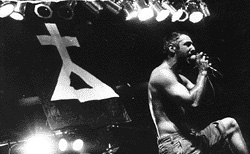 That must’ve put your lives on hold.
That must’ve put your lives on hold.
Richard: It killed the momentum. It was hard to play shows because we really couldn’t leave town.
J.R.: We opened a few shows for Fear, playing in places we hadn’t been in a while.
Ben: The worst part of it was we couldn’t tell anyone what was going on. We couldn’t tell the fans anything, partly for legal reasons, partly because we weren’t sure where we were going to be when this was over.
J.R.: Everyone in New England has been really cool, really supportive.
Richard: This record is pretty much for the kids in New England who’ve stuck by us for the last two years. We could’ve just taken the record and used it as a demo to shop to labels, but we decided we couldn’t wait any longer to release a record.
Ben: It’s D.I.Y., baby!
How old are the songs on That Which Doesn’t Kill Us…?
J.R.: Half the songs we’ve been playing for the last two years…
Ben: The silver lining to this whole ordeal is that we’ve written more prolifically than we ever have. We have over two full-lengths of material now.
Richard: The anger and frustration got the creative juices flowing.
Ben: Hate is the ultimate riff maker.
Richard: It’s either write riffs or punch someone in the face.
 So you have a new, self-released, eight-song EP…
So you have a new, self-released, eight-song EP…
All: CD. It’s over 30 minutes long. It’s a CD.
Richard: Actually, the record came pretty close to being a Wonderdrug Records release, but we really weren’t in a hurry to sign on the dotted line with anyone.
Ben: Ken (Cmar) was really helpful, giving us tips and helping us with films and proofs. He pretty much helped us with the whole process of releasing a self-released CD. Both Wonderdrug and CherryDisc wanted to put out the record, but we really wanted to do it ourselves.
What’s the average song length?
Ben: Probably four, four and a half minutes. They vary.
Richard: There are a couple of short ones, but “…Iron O’Rourke” is six minutes long. We have a one- minute song we didn’t put on there. Our classic punk rock song, “The Minute Waltz,” exactly 60 seconds long.
Ben: There are a couple long songs on there. We like writing long songs. Our epic ballads.
J.R.: Next we’ll be playing “Wanted Dead or Alive.”
Richard: Our black metal version.
J.R.: Just joking.
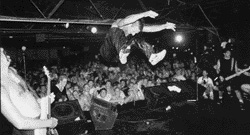 Jet, you don’t, like, talk much, huh?
Jet, you don’t, like, talk much, huh?
Jet: I’m conserving my energy.
You’re still a manic singer, obviously, but there don’t seem to be as many, ya know, losing it vocals. Screams, chants, banshee howls…
Jet: I didn’t really perceive a conscious stylistic change. There was plenty of screaming on Let in Life, and not so much on Superchrist, I think they’re just a little more well-placed. A while back, our tendency was to be frenetic all the time… It’s a hard thing to describe.
J.R.: The old stuff wasn’t as groove-oriented. We still play the fast stuff, and there’re quite a few fast songs that aren’t on the album.
Ben: And, for once, we had time in the studio to get the sounds we were looking for. We were always really rushed when working for Taang! Especially Jet. A lot of the things we had to compromise on in the past, we were able to spend more time on this time. Jet really had time to sing and work out his vocals.
It’s funny that you were able to make a better record yourself than anyone has every been able to give you.
J.R.: All we need is some one to love us and we’ll do the rest.
Ben: Now that all the bullshit is out of the way, we realize how fuckin’ cool it is to be in a band and be able to play your shit.
Richard: It’s the rebirth of Sam Black Church.
Ben: It’s not that we stopped, we just couldn’t talk about it.
Richard: The emancipation of Sam Black Church.

